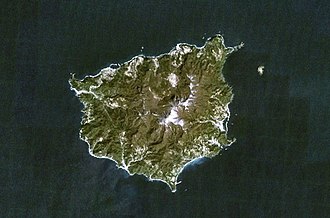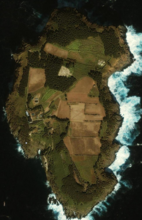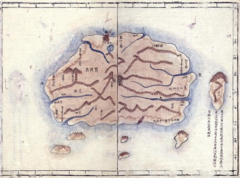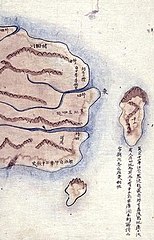| Revision as of 06:29, 21 December 2020 editB.C.Mayfield (talk | contribs)Extended confirmed users508 edits Undid revision 995476523 by 59.13.136.238 (talk) per Misplaced Pages’s naming conventionTag: Undo← Previous edit | Revision as of 06:35, 21 December 2020 edit undo59.13.136.238 (talk) →Outline: There are differences between Hanja and "Chinese Characters" because Hanja was adopted in Korea as a writing system, not as a language, thus it is not Chinese. Also, Hanja uses ancient Han characters which the recent Chinese people never use.Tags: Mobile edit Mobile web editNext edit → | ||
| Line 13: | Line 13: | ||
| == Outline == | == Outline == | ||
| Administratively, Jukdo belongs to Jeodong-ri, Ulleung township, ], ]. The ] used to write this island is ''Jukseodo'' ({{lang|ko|'''竹嶼'''島}}). | Administratively, Jukdo belongs to Jeodong-ri, Ulleung township, ], ]. The ] used to write this island is ''Jukseodo'' ({{lang|ko|'''竹嶼'''島}}). | ||
| Jukdo island, measuring {{convert|734|m|mi}} long and {{convert|482|m|mi}} wide. | Jukdo island, measuring {{convert|734|m|mi}} long and {{convert|482|m|mi}} wide. | ||
| The |
The Hanja for Jukdo (竹島) or Jukseo (竹嶼) mean "bamboo(竹) island(島)/islet(嶼)". Bamboo grasses grow in Jukdo, explaining the island's traditional name. <!-- 竹 means bamboo originally. But the word connotes "second" in Japan. The etymology is 松竹梅(Sho-ChikuBai, Pine Bamboo Plum) meaning "first second third". The meanings derive from Hanja ].--> | ||
| == Position and satellite photo == | == Position and satellite photo == | ||
Revision as of 06:35, 21 December 2020
Island in the Sea of Japan
| Korean name | |
| Hangul | 죽도 |
|---|---|
| Hanja | 竹島 |
| Revised Romanization | Jukdo |
| McCune–Reischauer | Chukto |
Jukdo (죽도/竹島) is a small island adjacent to Ulleungdo, South Korea, in the Sea of Japan. It was formerly also known as Jukseodo (죽서도/竹嶼島) in Korea and China and as Boussole Rock or Ou-san in Europe. It lies 2 km (1 mi) east of Ulleungdo, and is the largest island in the group apart from Ulleungdo itself. In 2004, one family of three members was living on the island.
Outline
Administratively, Jukdo belongs to Jeodong-ri, Ulleung township, Ulleung County, Gyeongsangbuk-do. The Hanja used to write this island is Jukseodo (竹嶼島). Jukdo island, measuring 734 metres (0.456 mi) long and 482 metres (0.300 mi) wide.
The Hanja for Jukdo (竹島) or Jukseo (竹嶼) mean "bamboo(竹) island(島)/islet(嶼)". Bamboo grasses grow in Jukdo, explaining the island's traditional name.
Position and satellite photo
- Ulleungdo/Jukdo
-
 A satellite image (facing north) of Ulleungdo. The small island to the northeast of Ulleungdo is Jukdo.
A satellite image (facing north) of Ulleungdo. The small island to the northeast of Ulleungdo is Jukdo.
-
 Position of Uleungdo, Jukdo and Liancourt Rocks
Position of Uleungdo, Jukdo and Liancourt Rocks
-
 Jukdo
Jukdo
Old Korean maps
- Ulleungdo/Jukdo
-
 Joseon map (1530)
Joseon map (1530)
-
 Joseon map (1530)
Joseon map (1530)
-
 Kim Jeong-ho "Daedongyeojido" (1861)
Kim Jeong-ho "Daedongyeojido" (1861)
-
 Kim Jeong-ho "Daedongyeojido" (1861)
Kim Jeong-ho "Daedongyeojido" (1861)
-
 A map by Korean Empire (1899)
A map by Korean Empire (1899)
See also
37°31′44″N 130°56′17″E / 37.529°N 130.938°E / 37.529; 130.938
This South Korea location article is a stub. You can help Misplaced Pages by expanding it. |